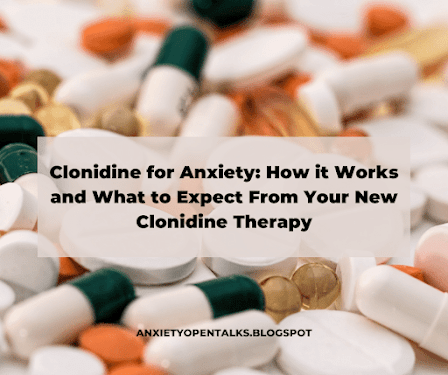Clonidine for Anxiety: An Overview (Potential Benefits & Side Effects)
Clonidine is an alpha-2 adrenergic receptor agonist that can be used to treat anxiety disorders. It has been widely used for the treatment of anxiety disorders and panic attacks, but it's also known to have other uses such as in treating insomnia.
However, it has its own side effects including drowsiness and dizziness. It can also cause a drop in blood pressure. It is important to note that clonidine can be addictive, but this does not mean it is unsafe to take daily or even on a long-term basis
Clonidine Dosage for Anxiety
One clonidine user left a comment that I find extremely practical:
You shouldn't take the entire 0.1 mg clonidine tablet. The majority of those who have complained about the medicine making them sleepy and exhausted are most likely vulnerable to clonidine and are taking far more than they should.
Because there is no smaller dose for this medication, your doctor will most likely prescribe 0.1 mg. If taking the entire 0.1 mg tablet makes you weary, cut it in half; if that still makes you sleepy, cut it into a 1⁄4; and if that still makes you tired, cut it into a 1/8. I propose investing in a pill cutter.
So, we can conclude that clonidine dosage for anxiety varies from one to another. You had better report your condition during taking Clonidine to your doctor so that he/she can make necessary adjustments to clonidine dosage.
Clonidine for Anxiety Reviews
Clonidine has a rating of 7.0 out of 10 based on 73 reviews for anxiety treatment. A positive impact was recorded by 62 percent of reviewers, while a negative impact was reported by 25 percent.
You can find more Clonidine for anxiety reviews on the Drug.com website. The above comment is also excerpted from there.
Clonidine for Sleep and Anxiety
Most people with anxiety disorders have sleep problems. It is reported by Clonidine use in psychiatry that Clonidine appears to be an appealing option for treating ADHD-related sleeplessness and remains a good treatment for pediatric sleeplessness in general.
Plus, Clonidine appears to be helpful and rather well-tolerated in insolvable sleep disorders in kids and teens with neurodevelopmental disorders.
Therefore, the chances are when someone has anxiety, Clonidine might help he/she fall asleep easier.
There are very few differences between clonidine for sleep and anxiety dosage, ranging from 0.17 to 0.6 mg, according to Mayoclinic. You can also find other reminders for the brand, the extended-release tablet.
How a Clonidine Efficacy Score Counts As An Important Tool For Patients & Clinicians
A clonidine efficacy score is a tool that helps patients and clinicians to make an informed decision about the efficacy of clonidine. It provides valuable information on the effectiveness of different doses and dosing regimens.In the past, clinicians had to rely on subjective patient reports to evaluate the efficacy of clonidine. The efficacy scores provided by clinicians were based on their own clinical experience.
With the introduction of a new piece of equipment, such as a clonidine efficacy score (CES), this can be replaced with objective information.
Effectiveness of Clonidine in Treating Anxiety & Depression With Outpatient Medications
Clonidine is a medication used for treating anxiety and depression. It is an alpha-2-adrenergic agonist that is commonly prescribed for treating both of these conditions.Clonidine has been shown to be effective in reducing anxiety, but it has not been as effective at relieving depression. The reason for this may be because the effects of Clonidine are related to dopamine and serotonin levels in the brain.
A study published in "Neuropsychopharmacology" found that Clonidine may have an effect on serotonin levels, which might explain why antidepressants are more effective at relieving depression than Clonidine.
Clonidine vs Propranolol for Anxiety
Propranolol reduces the physical signs of anxiety, such as preventing your heart from pounding too quickly. Propranolol is normally only used for a brief period of time. Anxiety's physical manifestations are generated by chemical imbalances in the brain. Clonidine acts by influencing the action of norepinephrine, a brain chemical (neurotransmitter). Norepinephrine impacts attention and alertness in addition to heart rate, blood pressure, and anxiety.This medicine calms down specific parts of the brain, rendering them "less excited." As a result, symptoms of anxiety, ADHD, sleep problems, tobacco withdrawal, and tic disorders improve.
Why Should I Take Clonidine? Is It Worth the Risk?
Clonidine is a medication used to treat high blood pressure, anxiety, and alcohol withdrawal. It is also used for the treatment of other conditions, such as depression and chronic pain. It is a central nervous system (CNS) depressant that works by reducing the activity of nerve cells in the brain.Although Clonidine has certain side effects, its effectiveness for treating anxiety disorders and other mental health issues has been proven.
As said before, if you experience any side effects, you are advised to report to your doctor. Even you feel that you become better a lot, you shouldn’t stop using Clonidine suddenly without discussing it with your doctor.



